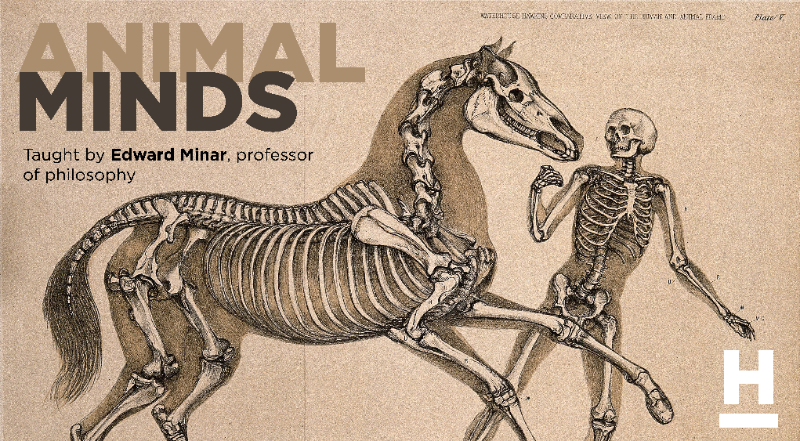Animal Minds

Animal Minds
HNRS 401H3-001
Ed Minar
Spring 2025
T 2 - 4:45 p.m.
GEAR 129
Course Application due Oct. 10, 2024 at 11:59 p.m.
Apply for Honors College Courses
Is there is a great divide between human beings and other animals, marked by mental or psychological characteristics that distinguish “us humans” from even our closest animal relatives? Such features might include rationality, language, tool use, culture, and self-awareness or sense of self. The idea of a wide gulf between humans and animals reinforced by perceived difficulties in obtaining knowledge of animal minds. After all, they cannot tell us what they think or feel. Some have regarded radical differences between humans and non-humans has as rationalizing the use of animals for human purposes. For example, if animals are thought not to be self-aware, their capacity to suffer, or at least the significance of their suffering, might be called into question.
Such (until recently, widespread) skepticism about animal minds contradicts the experience of animal trainers and others who work with animals on a daily basis. Moreover, their “folk knowledge” of the animals with whom we live, often criticized as anthropomorphic, is supported by recent advances in the scientific study of animal behavior. Researchers increasingly find – as Darwin and evolutionary theory would suggest – that the basics of rational thought, communication, culture, and self-consciousness are present in non-human species. In other words, the differences between “us” and “them” have in some ways been exaggerated. Does the breakdown of such a stark human/animal divide have consequences for how we human beings should treat our fellow creatures?
In this seminar, we shall explore some of these recent developments in our knowledge
of animal minds. Questions will include: What is consciousness, what is it for,
how did it evolve, how widespread is it in the animal kingdom? How much can we learn
about what it is like to be a dog, a bat, an octopus? Can we experience the world
from an animal’s point of view? What about self-consciousness or self-awareness in
animals? And about knowledge of “other minds”? (Can your dog know what you are thinking
or feeling?) What range of emotions do animals have? What do we know about animal
communication, and how is it best studied? What is culture, where and how is it exhibited
in animals? How should our approach to these and related questions affect our attitudes
toward the moral status of animals?
Readings will be from cognitive ethology, comparative psychology, philosophy, literature,
and animal training.
Course Credit
- All Students: 3 hours of honors credit
- Fulbright College:
- Humanities Colloquium
- Upper-level Humanities honors seminar
- Elective course for MEDH minor
- Walton College:
- Honors Colloquium credit
- Note: The other three hours of required honors colloquium courses would need to come from Walton.
- Honors Colloquium credit
About Ed Minar
 Edward Minar is Professor of Philosophy and former Chair of the Department. He has taught at
the University of Arkansas for over 25 years. He received A.B., A.M., and Ph.D. degrees
in Philosophy from Harvard University. His work is in part inspired by the great
twentieth-century philosopher, Ludwig Wittgenstein, on whom he has written extensively.
He is particularly interested in epistemology or theory of knowledge, where he explores
responses to skeptical doubts about everyday and scientific knowledge of the world
around us; in philosophy of language; where he is concerned with how language shapes
our world-views; and in philosophy of mind, where he focuses on the problem of other
minds (how we know or “get in touch with” the minds of other people and other animals).
He is the author of “What Your Dog Can Teach You about Philosophy of Mind” in Stephen
Hales, ed., What Philosophy Can Tell You about Your Dog, and he is working on books
on other minds and animals. He is interested in developing a “critical anthropomorphism”
justifying the use of psychological language traditionally limited to human beings
to understand animal behavior in both scientific and other contexts. He has been
working with dogs – competing in agility and obedience and teaching obedience classes
(in which dogs and their humans learn to communicate with each other) – for over twenty
years. He lives with three very intelligent and self-aware Australian Shepherds.
Edward Minar is Professor of Philosophy and former Chair of the Department. He has taught at
the University of Arkansas for over 25 years. He received A.B., A.M., and Ph.D. degrees
in Philosophy from Harvard University. His work is in part inspired by the great
twentieth-century philosopher, Ludwig Wittgenstein, on whom he has written extensively.
He is particularly interested in epistemology or theory of knowledge, where he explores
responses to skeptical doubts about everyday and scientific knowledge of the world
around us; in philosophy of language; where he is concerned with how language shapes
our world-views; and in philosophy of mind, where he focuses on the problem of other
minds (how we know or “get in touch with” the minds of other people and other animals).
He is the author of “What Your Dog Can Teach You about Philosophy of Mind” in Stephen
Hales, ed., What Philosophy Can Tell You about Your Dog, and he is working on books
on other minds and animals. He is interested in developing a “critical anthropomorphism”
justifying the use of psychological language traditionally limited to human beings
to understand animal behavior in both scientific and other contexts. He has been
working with dogs – competing in agility and obedience and teaching obedience classes
(in which dogs and their humans learn to communicate with each other) – for over twenty
years. He lives with three very intelligent and self-aware Australian Shepherds.